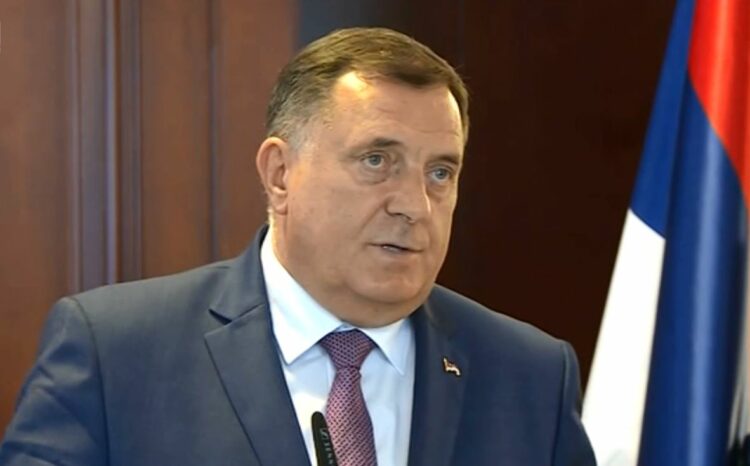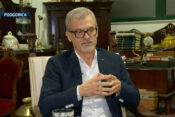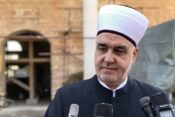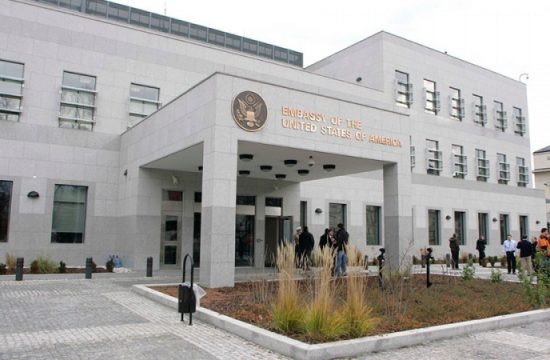
Political and religious officials in Sarajevo are trying to internationalise the incidents in Montenegro in an attempt to help the outgoing government which is inappropriate, harmful and dangerous, the Serb member of Bosnia’s tripartite Presidency said on Thursday, commenting on statements by Bosniak officials who condemned the recent attacks on Bosniaks in the country following the election.
Reports about physical attacks and threats targeting the Bosniak community in Pljevlja, Montenegro, have caused concern among Bosnian officials in recent days.
The head of Bosnia’s Islamic Community, Husein Kavazovic, reacted to the “anti-Muslim messages of hate which can be heard more and more often” in Montenegro and to a recent physical attack on Bosniaks in the town of Pljevlja, arguing that the situation reminds of a “return of the ideologies that already led to crime and genocide in this area in the 1990s.”
On Tuesday evening, the building of the Islamic Community in Pljevlja was targeted by vandals who broke the door glass panes and left threatening messages.
The incidents came days after Montenegro's parliamentary election which saw opposition coalitions in the country taking the majority in parliament from President Milo Djukanovic’s Democratic Party of Socialists (DPS) after nearly three decades of the rule.
The Chairman and Bosniak member of the tripartite Presidency, Sefik Dzaferovic, discussed the election results and the attacks on Bosniaks with Montenegrin President Milo Djukanovic in a phone conversation on Wednesday.
He asked Djukanovic to ensure that Montenegro's institutions put an effort into protecting Bosniaks and prevent new attacks, threats and provocations.
The election process in Montenegro went smoothly and all the parties accepted the results so there is no point in anybody “from the outside” commenting on it, Bosnian Serb Presidency member Milorad Dodik said.
“The unpleasant scenes from several cities in Montenegro where Bosniaks – Muslims live are a job for the competent police authorities of Montenegro, which are still under the administration of the government which has not been changed yet and which is obliged to find the perpetrators of these vandal acts,” he said.
He also praised the leaders of the winning parties, saying they reacted to the incidents and visited the places where they happened. Someone who “surely does not want good for Montenegro” is trying to “portray the winning parties as backwards forces which want to destabilise Montenegro,” he argued.
According to Dodik, “the responsibility for a stable and peaceful Montenegro still lies with the party which has been ruling in that country for 30 years as well as with everyone else there” and “nobody from outside of Montenegro should interfere.”
“This is why I believe that the behaviour of Bosniak political and religious leaders in Bosnia and Herzegovina is not only harmful but also dangerous, as the terminology and argumentation they are using is nothing other than the repetition of old patterns which doesn’t contribute to calming tensions in our neighbouring and brotherly country and is meant more for their internal purposes,” he said.
When listening to Kavazovic, Dzaferovic or Bosnian Croat Presidency member Zeljko Komsic, who also condemned the attacks, one might think that the incidents that happened took place in Bosnia, Dodik said.
“Montenegro has its own police and judicial bodies, it has its own Islamic Community and I believe that both are capable of resolving these issues without preaching from Sarajevo. I am satisfied with the fact that the Serbian Orthodox Church in Montenegro was swift to react and stood in defence of coexistence and good relations with Muslims,” Dodik said.
Dodik also mentioned that Komsic had openly expressed support for Djukanovic before the election took place but argued that the Bosnian Croat politician must be aware that the DPS leader was defeated in the election and that Montenegro’s people decided for themselves who should run the country in the future.
“This narrative about a Greater-Serbia project, which Komsic is mentioning, is nothing more than an attempt to intimidate people outside of Montenegro, inappropriate meddling in the issues of the neighbouring country and creating an atmosphere in which the winners of the election are preemptively being declared destructive although they haven’t even had time to do anything yet,” he said.
The Bosnian Serb leader said that some could argue that “a dangerous anti-Serb policy” is behind the reactions coming from Sarajevo and asked why Komsic would suspect that supporters of the winning parties in the country are behind the incidents without asking himself why this would be in their interest.
Instead of congratulations and attempts to ensure good cooperation with the future government in Montenegro, what can be heard from Sarajevo is “complaining because of the fact that the people of Montenegro decided the way they did,” he argued.
“The political and religious Sarajevo is trying to internationalize the incidents in Montenegro thinking that it is helping the outgoing government that way, which is not only inappropriate but also very dangerous and harmful,” he said.
Dodik added that he never hid who he supports in the election in Montenegro but that he would “never with my own words or deeds give myself the right to regulate relations in Montenegro.”






